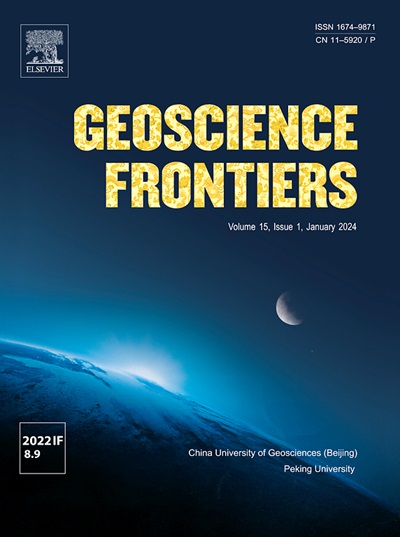How digitalization, renewable energy, and natural resources shape environmental excellence? Evidence from China using a Quantile-on-Quantile framework
IF 8.9
1区 地球科学
Q1 GEOSCIENCES, MULTIDISCIPLINARY
引用次数: 0
Abstract
Natural resources, green energy, and sustainable development are closely linked with concepts that carry mutual goals to endorse social equity, economic prosperity, and ecological stability while curtailing the harmful influence on the globe. However, the recognition of the Sustainable Development Goals (SDG-7, SDG-13) is closely entangled with digital economy. In this pursuit, this study scrutinizes the effect of digitalization, renewable energy, and natural resources on the ecological footprint in China from 1990Q1-2022Q4. The empirical analyses are carried out by employing the Quantile-on-Quantile regression, and cross-quantile and partial cross-quantile correlation approaches to inspect the tail dependence of model parameters. The empirical outcomes highlight how China’s environmental quality is influenced by exogenous variables, including digitalization index, renewable energy consumption, and natural resources. Digitalization has adverse impact on the ecological footprint in lower quantiles, while insignificant in higher quantiles. Moreover, a strong adverse association exists between ecological footprint and renewable energy, which syndicate all the quantiles of renewable energy with linking over lower to middle quantiles and weak in higher quantiles of ecological footprint. Besides, the estimated analysis discloses nuanced dependencies across various quantiles. Similarly, it can be found that the strong negative effect of natural resources on ecological footprint in initial quantiles, moderate in middle quantiles, and less positive effect in higher quantiles. By explaining these dynamics, the current study offers valuable intuitions designed at controlling China toward its dual-carbon target and encouraging the development of a sustainable digital and green economy and thereby, continuing towards achieving SDG-7, and SDG-13 objectives.

数字化、可再生能源和自然资源如何塑造卓越的环境?使用分位数对分位数框架的中国证据
自然资源、绿色能源和可持续发展与具有促进社会公平、经济繁荣和生态稳定同时减少对全球有害影响的共同目标的概念密切相关。然而,对可持续发展目标(SDG-7、SDG-13)的认识与数字经济密切相关。为此,本研究考察了数字化、可再生能源和自然资源对1990 - 2022q4年中国生态足迹的影响。采用分位数对分位数回归、交叉分位数和部分交叉分位数相关方法进行实证分析,检验模型参数的尾部依赖性。实证结果突出了数字化指数、可再生能源消费和自然资源等外生变量对中国环境质量的影响。数字化对低分位数的生态足迹有不利影响,而对高分位数的生态足迹影响不显著。此外,生态足迹与可再生能源之间存在强烈的负相关关系,所有可再生能源分位数与中低分位数之间存在关联,而生态足迹的高分位数之间存在弱关联。此外,估计分析揭示了不同分位数之间细微的依赖关系。同样可以发现,自然资源对生态足迹的负面影响在初始分位数范围内较强,在中等分位数范围内较弱,在较高分位数范围内正向影响较小。通过解释这些动态,本研究提供了有价值的直觉,旨在控制中国实现其双碳目标,鼓励可持续数字和绿色经济的发展,从而继续实现可持续发展目标7和可持续发展目标13。
本文章由计算机程序翻译,如有差异,请以英文原文为准。
求助全文
约1分钟内获得全文
求助全文
来源期刊

Geoscience frontiers
Earth and Planetary Sciences-General Earth and Planetary Sciences
CiteScore
17.80
自引率
3.40%
发文量
147
审稿时长
35 days
期刊介绍:
Geoscience Frontiers (GSF) is the Journal of China University of Geosciences (Beijing) and Peking University. It publishes peer-reviewed research articles and reviews in interdisciplinary fields of Earth and Planetary Sciences. GSF covers various research areas including petrology and geochemistry, lithospheric architecture and mantle dynamics, global tectonics, economic geology and fuel exploration, geophysics, stratigraphy and paleontology, environmental and engineering geology, astrogeology, and the nexus of resources-energy-emissions-climate under Sustainable Development Goals. The journal aims to bridge innovative, provocative, and challenging concepts and models in these fields, providing insights on correlations and evolution.
 求助内容:
求助内容: 应助结果提醒方式:
应助结果提醒方式:


